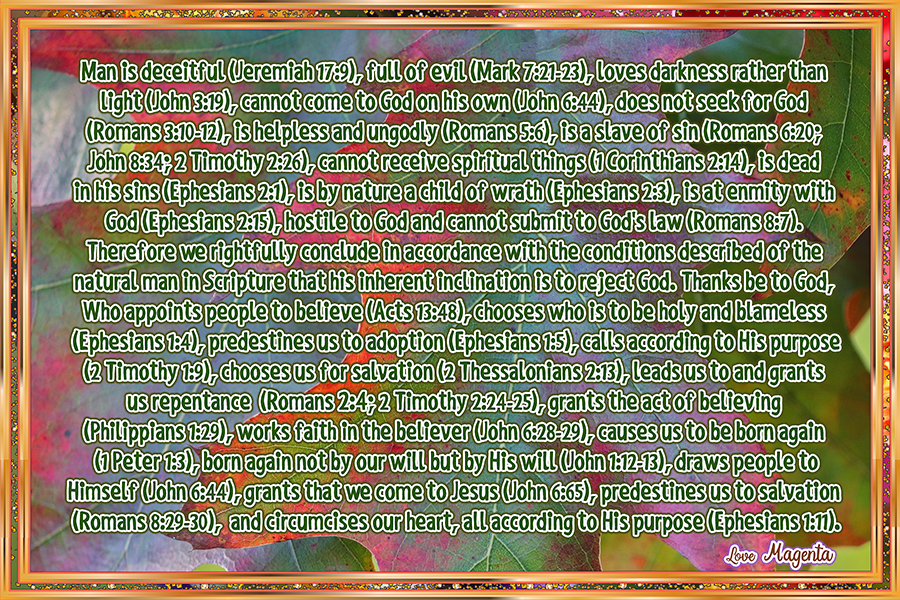According to my understanding of scripture:
There is no absolute free will as there is no absolute preordination. The truth is found somewhere between the two and that's why there is such confusion regarding this topic. If our every act and thought has been preordained by the Lord, that would mean that he is the ultimate respecter of persons and that he is the creator of evil. Both are impossible to the Lord's divine nature. In James 1: 13-15, we're told, "
Let no man say when he is tempted, I am tempted of God: for God cannot be tempted with evil, neither tempteth he any man: But every man is tempted, when he is drawn away of his own lust, and enticed. Then when lust hath conceived, it bringeth forth sin: and sin, when it is finished, bringeth forth death." We see by this scripture that the Lord does not make us to be tempted, nor forces us to sin, so we're each tempted when our own lusts entice us. This then leads us to sin according to 1 Jn 3: 4. "
Whosoever committeth sin transgresseth also the law: for sin is the transgression of the law." Does this mean that I'm ruled by my free will alone, at least until I sin? No, because we learn from Rom 5: 12-14, "
For as many as have sinned without law shall also perish without law For until the law sin was in the world: but sin is not imputed when there is no law. Nevertheless death reigned from Adam to Moses, even over them that had not sinned after the similitude of Adam's transgression, who is the figure of him that was to come. This we received for Adam because of his sin. When we give ourselves to sin we become the slaves to our sins as revealed by Jesus in Jn 8:34, "
Jesus answered them, Verily, verily, I say unto you, Whosoever committeth sin is the servant of sin." Let me add here that we inherited an easeness to sin from Adam, which even before the law was given to Moses, Adam's descendants died because by him; sin entered into the world and death by sin came unto all men for all have sinned. In Rom 2: 12, we're told, "
For as many as have sinned without law shall also perish without law;"
Why would the Lord do that to us, you might ask? The Lord is eternal and he wanted his loved ones to abide with him in eternity! But even the most adament, person who refuses to sin, would sooner or later commit a sin that would bring the curse of death, required by the Lord's holy and just nature. So he made us in such a way that we'll sin sooner rather than later. He had a plan that would allow him to forgive us ahead of eternity, thereby ensuring that we'd be with him forever, without forsaking his qualities of absolute justicce and holiness. So it's easy for us to sin by our Adam given natures, called by some, original sin, and once we do we become servents to sin. The Lord also wants us to want him and to want to be holy as he is holy.
For this he uses faith, in those who will turn to him for that eternal forgiveness, Thus, "many are called, but few are chosen." The chosen are those who respond the the Spirit's call and conviction of sin by turning to the Lord Jesus for forgiveness. The Holy Spirit's job as revealed to us in Jn 16: 8-9, "
And when he is come, he will reprove the world of sin, and of righteousness, and of judgment: Of sin, because they believe not on me;" For those who do not believe upon Jesus and who are being ministered by a member of the body of Christ, he calls and convicts them of their sins. If they respond with a sorrow after the world, they reject that call and are not chosen. If they respond with a godly sorrow leading them to repentance and believe the word of God being ministered unto them; Jesus puts a mustard seed of faith in their souls and the Holy Spirit baptizes them into the body of Christ and indwells their spirits, making them to be born again. Spiritual growth is now possible via scripture which the Hoy Spirit illuminates, here a little, and there a little. With illumination, the Lord fulfils the promise of the New Covenant, by writing his commandments upon the table of their hearts and minds which purifies their conscience to see sin as he does, little by little. This transforms the faithful by the renewing of their minds to perceive sin as the Lord does, more and more. The Holy Spirit, in due course, will apply the "blood of Jesus to their conscience, purging their conscience from dead works to service the living God". He'll also increase their faith and make the scripture to be Jesus talking with them, Spirit to spirit and they will grow closer to him. We can see this in 1 Pet 2: 2-3, "
According as his divine power hath given unto us all things that pertain unto life and godliness, through the knowledge of him that hath called us to glory and virtue: Whereby are given unto us exceeding great and precious promises: that by these ye might be partakers of the divine nature, having escaped the corruption that is in the world through lust.
Rom 8:6, "For the mind set on the flesh is death, but the mind set on the Spirit is life and peace,"

1




